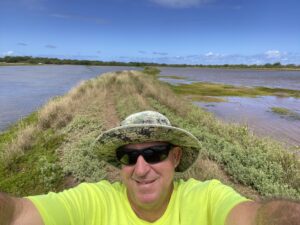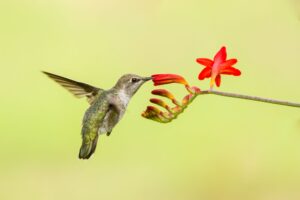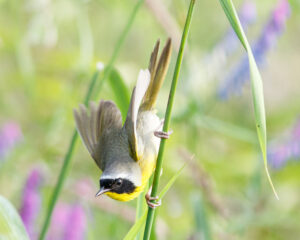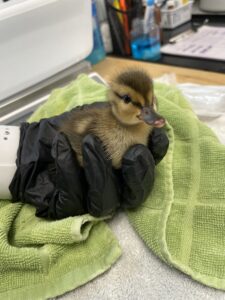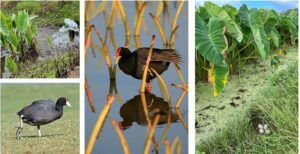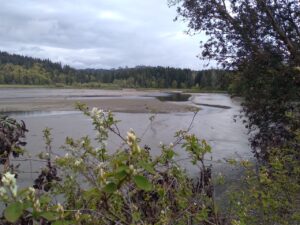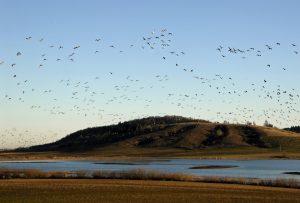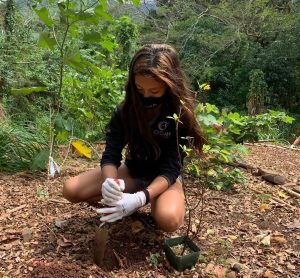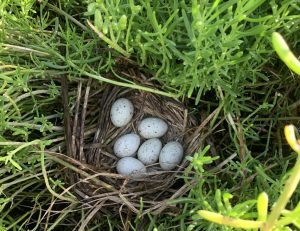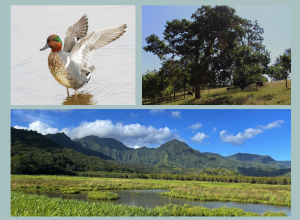Work with Us
If you have a project in the U.S. that benefits native birds and their habitats, we encourage you to apply for a Pacific Birds Partnership Grant. We support projects that align with the goals of our conservation priorities: Coastal Habitats, including Coastal Wetlands in the Pacific Northwest and Alaska and Hawaiʻi Wetlands, and Western Forests, specifically Oak and Prairie.
Pacific Birds helps partners identify, prioritize, and implement conservation actions that benefit birds and the habitats they need. These actions include but are not limited to conserving habitat, inspiring action for bird conservation, developing and synthesizing data, increasing organizational capacity, and creating and sustaining partnerships that enact local or regional habitat conservation work. Proposals led by Indigenous peoples, organizations, and communities working to advance Indigenous priorities within the scope of this opportunity are encouraged to apply.
Projects must be located within these regions of the Pacific Birds service area: Alaska, Hawaiʻi, and the western portions of Washington, Oregon, and northern California. Grant applications will be accepted up to a maximum of $15,000 but most awards will be in the range of $5,000 to $10,000.
While match funding is not required, projects that include match will receive additional consideration.
We welcome new partners to our grants program. Please contact us if you have questions. We recommend that you speak to your Conservation Coordinator about any proposed applications before submission.
We are no longer accepting proposals for the 2024 Partnership Grants cycle. Please check back in Spring 2025 for the next round.
2024 Projects
Awardee: Long Tom Watershed Council
Tribes and Indigenous-led organizations from around the Pacific Northwest are revitalizing cultural burning practices and exchanging knowledge with one another. The project will contribute to the refinement of cultural burning practices and processes in the Willamette Valley by funding local cultural burn practitioners and out-of-region cultural burn leaders to engage in two days of learning and burning in 2024 or 2025. Culturally-embedded land tending practices including the intentional use of fire have inherently maintained the rich biodiversity of Willamette Valley oak and prairie landscapes for millennia. Revitalization of these cultural practices and directing resources toward the communities who carry them out are essential if the restoration and preservation of these landscapes are to be successful.
Awardee: Northwest Watershed Institute
Dabob Bay is recognized as one of the most biologically diverse and high-quality estuarine embayments remaining in Puget Sound and is of great importance to a diversity of PNW bird species. For this project, the Northwest Watershed Institute will work closely with the Department of Natural Resources and other partners to provide an updated and expanded GIS map-based assessment, based on NWI’s 2022 assessment, that prioritizes parcels within the July 2024 expanded boundaries of Dabob Bay Natural Area, based on landowner interest in selling and ecological importance. The soon-to-be expanded boundary includes an additional 90 parcels, for a total of over 300 private parcels within the Dabob Bay Natural Area boundaries.
Awardee: Kachemak Heritage Land Trust
The project is a collaborative co-stewardship project spearheaded by KHLT planning for work with the First Alaskans Institute (FAI), as well as the Port Graham Native Corporation and Kenaitze Indian Tribe, IRA to incorporate Indigenous stewardship practices into the land trust’s conservation toolbox. KHLT will work with Kenai Peninsula Alaska Native landowners who are interested in selling their Native Allotments as well as local tribes to purchase and rematriate lands, so that they may be maintained according to tribal conservation values. By adopting stewardship practices from those at the First Alaskans Institute, the Paluwik Native Corporation, and the Kenaitze Indian Tribe, KHLT hopes to bridge its current land management practices and those used by the organization’s Indigenous partners to protect coastal wetlands and preserve critical habitat for vulnerable migratory bird species that live and breed here.
Awardee: National Audubon Society
Alaska’s coastal wetlands link together a network of globally important stopover and nesting sites for migratory waterbirds. These wetlands are increasingly at risk due to local development projects including transportation infrastructure, harbor upgrades, and dredging for fill materials. For this project, Audubon Alaska will work with partners to participate in and build broad, diverse, and impactful working groups that represent a diversity of interests in public land use and protection (e.g., outdoor recreation, hunting, and fishing, ecosystem protection), and empower them to communication about management and protection of Alaska’s critically important coastal wetlands. The project will specifically focus on local communities where development projects within Important Bird Areas are proposed on the Pacific Americas Flyway (e.g., Mendenhall Wetlands, Odiak Slough).
Awardee: ʻĀina Hoʻōla Initiative
The Lokowaka Pond Wetland Restoration project will sustainably benefit wetland habitat and provide critical habitat for endemic and migratory waterbirds at Lokowaka Pond, in Hilo, Hawaiʻi. The project will also build local capacity by bringing together conservation experts, local groups, and volunteers to support wetland conservation actions while amplifying the importance of these habitats for Threatened and Endangered (T&E) waterbirds in Hawaiʻi. Specifically, the project will create a thriving habitat for Hawaiian waterbirds by removing invasive plants and outplanting native species, implementing predator control, and carrying out educational outreach to expand public awareness of the benefits of wetlands restoration, conservation, and Indigenous agroecology such as loko iʻa (Native Hawaiian fishponds).
Awardee: Learning Endeavors
This project will inspire action for bird conservation across the Hawaiian Islands through a multi-faceted education and community science initiative. Learning Endeavors (LE) will develop a Wetland Warriors statewide online course covering Hawaiian wetland ecology, bird conservation, citizen science opportunities, priority local wetlands, and cultural perspectives. Online course participants and LE partners will receive a kit with resources including a monocular, a field guide, and printed resource materials to continue their education outside of the course. LE Partners will also host field tours at local wetlands allowing for bird observation, community science data collection, and, if available, volunteer opportunities to participate in restoration.
Awardee: Livable Hawaii Kai Hui
Livable Hawaii Kai Hui works to protect, preserve, and restore the natural resources of East Honolulu, Oʻahu. This project aims to enhance and expand an ongoing restoration effort for ʻaeʻo (Hawaiian Stilt; Himantopus mexicanus knudseni) and a genetically significant subpopulation of ʻalae ʻula (Hawaiian Moorhen; Gallinula chloropus sandvicensis). It will transform an important cultural site into a community hub, fostering a practice centered around the mālama (care) of Hawaiian freshwater species and promoting their abundance. The project goals include: (i) enhancing the restoration of the ʻalae ʻula subpopulation by controlling invasive plant species, (ii) creating mudflats to provide additional habitat for the ʻaeʻo, and (iii) fostering community connections with these waterbirds by sharing information about their cultural and ecological significance.
Awardee: Ecostudies Institute
There is a lack of baseline knowledge about the status and habitat preferences of many estuarine bird species in the Salish Sea – knowledge that is key to understanding the impacts of restoration activities, a rapidly shifting climate, and future conservation actions. The Salish Sea Estuaries Avian Monitoring (SSEAM) Framework aims to elucidate fine-scale avian habitat associations in the Puget Sound region, by using a standardized study and sampling methods that allow data to be pooled across sites to yield broad-scale results. In the current phase, funded by Puget Sound Partnership (PSP), we have begun connecting with partners, implementing protocols at new and existing locations, and building a long-term database. This grant will support project setup, training, and coordination, and help the team engage with partners across the Pacific Flyway. The project will also include data collection for spring waterfowl, shorebird migration, and breeding seasons (April-June 2025).
2023 Projects
Awardee: Southeast Alaska Land Trust and Kachemak Heritage Land Trust
Alaska’s land trusts are ready to strengthen their informal partnership by establishing a statewide land trust association. Alaska’s five land trusts and one agricultural land trust will work with The Conservation Fund, The Land Trust Alliance, and other partners to identify common conservation goals, solidify partnerships, and develop a framework for a statewide organizational structure that addresses best practices, mutual aid, training, fund development, and advocacy.
Awardee: Friends of the Dunes
Building on successful partnerships previously supported by Pacific Birds, Friends of the Dunes will engage the Wiyot Tribe as a long-term conservation partner for the entire Samoa Dunes and Wetlands Conservation Area, while continuing to steward this 357-acre, wetland-rich property. In addition to the environmental justice benefits, this project will also have tangible benefits for the conservation of coastal wetlands and mudflats and the many bird species these habitats support.
Awardee: Lomakatsi Restoration Project
Lomakatsi Restoration Project through the Inter-Tribal Ecosystem Restoration Partnership (ITERP) will host the ITERP Peer-to-Peer Learning Summit in November in Sunriver, Oregon. The event aims to elevate tribal partnerships in collaborative forest and watershed restoration and increase tribal inclusion in restorative forestry agreements and aquatic restoration initiatives that empower partnerships to co-manage, co-invest, and collaborate on a landscape scale. Incorporating Indigenous Traditional Ecological Knowledge (ITEK), ecocultural restoration, habitat conservation, cultural fire, and cultural resource protection into collaborative ecosystem resilience initiatives is mutually beneficial and makes projects more successful. The Tribal Summit provides a historic opportunity for addressing these needs and establishing a framework to support ongoing collaboration among tribes and with other agencies and organizations working across Oregon to build ecosystem and community resilience to the mounting impacts of climate change.
Awardee: Oregon Agricultural Trust
The interior valleys of the Umpqua River basin are home to some of the most extensive oak savannas and woodlands in the Pacific Northwest. Expanding the work of land trusts in Douglas County was identified by partners as a high priority need identified in the Umpqua Oak Partnership’s (UOP) strategic planning process. Oregon Agricultural Trust will work with landowners and nonprofit and agency partners, through UOP, to extend their Farm and Ranch Protection Plan to Douglas County. This project will include maps of primary data layers and focused investment zones, a summary of important agricultural, bird, and oak habitat conservation goals, and GIS data-driven recommendations for outreach to private landowners.
Awardee: Hui o Ho`ohonua
Hui o Ho`ohonua (HOH) is already working on restoring and connecting wetland bird habitat in the `Ewa region of O`ahu, around Pearl Harbor, but current funding via the National Fish and Wildlife Foundation Coastal Resilience Fund and the USFWS National Coastal Wetland Conservation grants does not address key aspects of shoreline wetland restoration including community engagement, maintenance of restored habitat, wetland bird monitoring, education and predator control. This project seeks to address the identified gaps and create sustainable, holistic strategies to carry out restoration and maintenance work.
Awardee: Makauwahi Cave Reserve
Project proposes removal of invasive species, outplanting and predator control and important wetlands at Makauwahi Cave Reserve for the benefit of T&E waterbirds and shorebirds. There will also be increased avian monitoring and the propagation of 2,000 additional native wetland plants and preferred Nēnē (Branta sandvicensis) feeding and nesting plants on adjacent uplands. Relatively little management work occurring to benefit Nēnē on Kauaʻi. This is a key site for their recovery, and could inform and inspire similar habitat improvements elsewhere if outplanting are successful.
Awardee: BirdNote
BirdNote first aired in 2005 to inspire and nurture human connection to the joy and wonder of birds via short, compelling, science-based stories. Since then, their reach has expanded to 460+ markets (including 275 NPR stations across the US) and 5 million+ people across all of their platforms (radio, podcasts, social media), in 201 countries and territories. They will work with Pacific Birds staff and partners to develop three BirdNote episodes featuring: coastal wetland habitat and native birds as it relates to climate change, increasing awareness of the value of oak and prairie habitats and related threats, and raising awareness of the wonders of migratory birds that rely on Hawaiian wetlands. One to two shows produced with this grant will become BirdNote in Español episodes, reaching historically excluded audiences in regions covered by this grant, at least 43,000 listeners/month. Years of qualitative evidence shows BirdNote generates public awareness that leads to positive conservation actions by our listenership.
2022 Projects
Awardee: Audubon Washington
Kennedy Creek Estuary in South Puget Sound supports significant concentrations of migratory shorebirds and waterfowl and is within an Important Bird Area. Altered water flow caused by Highway 101 has led to habitat erosion, prompting Audubon Washington to convene partners around land acquisition and restoration projects. Pacific Birds is supporting a feasibility study related to estuary restoration.
Awardee: Ka Ipu Makani Cultural Heritage Center
The Kākahaʻia Community Restoration Project is a collaborative effort to restore a 40-acre coastal wetland ecosystem in Hawaiʻi. Ka Ipu Makani Cultural Heritage Center and partners will conduct a scoping process that will guide restoration of a portion of Kākahaʻia National Wildlife Refuge. Collaborative relationships and Indigenous Knowledge are integral to this landscape restoration which will also support threatened and endangered waterbirds. The partnership award supports community meetings and events and will fund an ethnohistorical study and a conceptual restoration design.
Awardee: Ecostudies Institute
The Willamette Valley project will build additional capacity to implement prescribed fire on Tribal and private lands. Thirty partners will be involved in various ways in the development of an ecological fire crew and regional coordination team; in regional training opportunities; and in increased burning on non-federal lands and increasing capacity for burning on federal lands. The long term goal of this project is to establish a regional fire collaborative that centers on Indigenous people and their priorities, and that improves land and community.
Awardee: Copper River Watershed Project
The Copper River Watershed Project will conduct wetland-themed education programs, including student and teacher professional development outings onto the Copper River Delta. Participants will assist with data collection on wetland ecosystems, work with the U.S. Forest Service to maintain Dusky Canada Geese nest islands, and monitor for invasive species.
Awardee: Hawai‘i Wildlife Center (Fiscal Sponsor for SOS)
Save our Shearwaters (SOS) is the only facility on Kauaʻi licensed to rehabilitate all native Hawaiian birds. In recent years, the need for rehabilitation of wetland birds has increased significantly and continues to rise as imperiled populations fight anthropogenic threats. To address these threats, this grant award will allow SOS to grow their operations, rehabilitate a greater diversity of birds, and continue to be a resource for threatened and endangered waterbirds on Kaua‘i. They will construct a waterbird pen and a waterfowl conditioning pool, purchase incubators, and conduct outreach.
Awardee: Columbia Land Trust
In early 2022, the East Cascades Oak Partnership (ECOP) secured a grant from the Oregon Watershed Enhancement Board to create an outreach and engagement plan in alignment with ECOP’s Strategic Plan, and a monitoring plan to help track progress against ecological objectives. Pacific Birds previously supported ECOP to create a monitoring module that measures fire impacts in oak systems, and create a management framework that outlines how they will provide technical support to partners. This award provides support to continue with these important projects, refine their assessment tool, and advance additional strategies and priorities.
Awardee: The Wetlands Conservancy
The Wetlands Conservancy recognizes the impacts of climate change and its visible, significant impacts on the Central Oregon Coast. They will engage community members, students, and landowners in conversation and action about coastal wetlands and their importance to migratory birds and other species. They are also fostering a relationship with The Confederated Tribes of Siletz Indians in order to learn about First Foods, and how specific land management practices can support Indigenous cultural practices.
Awardee: Partnership for Umpqua Rivers
This award will further the capacity and growth of the Umpqua Oak Partnership, located in a stronghold for Oregon white oak. An extensive group of partners are motivated to grow this developing conservation effort in the Umpqua. Collaborating with new and existing members, the partnership will organize and facilitate local meetings; conduct tours; finalize and begin implementation of the Strategic Action Plan; create landowner outreach; and develop a funding strategy.
2021 Projects
Awardee: Friends of the Dunes
Friends of the Dunes will engage the Wiyot Tribe as a long-term conservation partner for the bayside parcels of the existing Samoa Dunes and Wetlands project, while continuing to steward the entire 357-acre property and completing the transfer of open dune, coastal wetland, and coastal forest habitats of the Samoa Dunes and Wetlands to the BLM for long-term conservation management. Friends of the Dunes will also partner with the Wiyot Tribe and Humboldt State University on an exciting new conservation acquisition in southern Humboldt Bay, on a wetland-rich coastal property that includes Great Egret and Great Blue Heron roosting areas.
Awardee: Kahoʻolawe Island Reserve Commission
The island of Kahoʻolawe has been severely degraded from wind and rain erosion due to the introduction of grazing ungulates and wildfires. Soil studies have shown that much of the remaining soil on Kahoʻolawe lacks many components of a healthy soil profile. Project partners will develop a novel technique that uses biochar to improve the health of the soil in three coastal and wetland project sites on Kahoʻolawe. These sites are currently undergoing restoration efforts to stabilize dune structures and increase the native biota, improving habitat for native Hawaiian birds.
Awardee: Klamath Bird Observatory
Klamath Siskiyou Oak Network (KSON) conserves oak habitats in southern Oregon and northern California. KSON’s Strategic Conservation Action Plan outlines the need for increased engagement with Indigenous people in restoring oak woodland habitats–as an act of restorative justice and as a means for realizing the multiple ecological and social benefits that come from incorporating Traditional Ecological Knowledge into restoration planning and evaluation. This project will engage with Tribal governments, leaders, and communities through outreach to all Tribe(s) within the KSON geography and in-depth efforts to engage the geographically appropriate Tribe(s) in an upcoming proposal for restoration implementation and development of the Monitoring Strategy.
.
Awardee: The Conservation Fund
The Conservation Fund is working to permanently protect 309 acres of coastal wetland habitat in the Kasilof River Flats Important Bird Area (IBA)—an Audubon global priority IBA—located on Alaska’s Kenai Peninsula. The estuarine delta and near-shore areas provide habitat for seabirds, while tidal ponds and sloughs provide important stopover feeding areas for migrant waterfowl and shorebirds. 165 bird species have been observed in the Kasilof River Flats, including 37 state Species of Greatest Conservation Need. The property will be added to the Alaska State Parks system.
Awardee: Friends of Kauaʻi Wildlife Refuges
This project will enhance the water infrastructure on Hanalei National Wildlife Refuge, one of the largest and most important wetlands on the Island of Kauaʻi. It will improve the habitat of five endangered or threatened endemic species in addition to a number of migratory species. Since 2011, the Refuge has had severe avian botulism outbreaks due to an outdated water supply system, impacting at least 1,600 birds. Project funding will support the cost of acquiring and installing new water infrastructure across the kalo loʻi (taro fields) and wetland management units, helping to reduce and mitigate the incidence of avian botulism outbreaks.
Awardee: Long Tom Watershed Council
This project will build prescribed fire capacity on Tribal and private lands, working in close collaboration with federal and public lands partners in the Willamette Valley. Collaborating with two Tribes, and more than 30 partners, the Long Tom Watershed Council will move forward the establishment of a five-person year round ecological fire team and regional prescribed fire coordinator; regional training opportunities; close collaboration with Tribal and federal partners; and increased burning on non-federal lands. The partners are committed to developing a regional prescribed fire program that centers Indigenous people and their priorities, and improves land and community health.
Awardee: Partnership for the Umpqua Rivers
This project aims to develop a more cohesive and strategic approach to restoration, conservation and adaptive management practices in Oregon’s South Coast wetlands and estuaries. It will bring Watershed Councils, Soil and Water Conservation Districts, Tribes, agencies, NGOs, and landowners together in a new collaborative to identify additional partners and potential projects, secure funding, and provide outreach for local officials and stakeholder groups. Project support will facilitate the development of an initial governance structure and strategic approach for the new collaborative.
Awardee: North Shore Community Land Trust
Waialee Lako Pono is a multidisciplinary, collaborative effort to restore a 25-acre coastal wetland agroecosystem and surrounding area in Waialeʻe, Oʻahu, Hawaiʻi. In an effort to restore lako pono (social-ecological abundance) at Waialeʻe, the North Shore Community Land Trust will be undertaking a planning process to guide the long-term implementation of the project, with a particular focus on endangered native Hawaiian birds. This planning process will entail measuring environmental baselines, consulting with experts, partners and the public in a series of meetings, workshops and field visits, and producing a long-range restoration work plan.
Awardee: Columbia Land Trust
The East Cascades Oak Partnership (ECOP) will advance oak management by developing a management decision-making tool that is responsive to stakeholder values and needs and considers the diverse way oak systems present in the East Cascades. The management decision tool will consider people in the suite of ways they interact with oaks: residential and working lands, fire suppression and hazard abatement, and first foods.
Awardee:Hawaii Department of Land and Natural Resources, Division of Forestry and Wildlife (DOFAW)
There is a critical need to fill knowledge gaps about endangered Hawaiian waterbirds, since these species will require active management in perpetuity. This project will identify causes of mortality for endangered Hawaiian Gallinule chicks, using radiotelemetry to determine which management actions best protect gallinules at their most vulnerable life stage. Results will be shared with wetland managers statewide and submitted for publication to a peer-reviewed journal.
Awardee: The Willamette Partnership
The Oak Accord will design a more sustainable and durable model of delivering resources to support restoration of functional oak habitat in Oregon. This includes creating a collaborative conservation model with local, state and federal partners that will more effectively connect the financial and technical resources to landowners. It also includes the design of a business model for the Oak Accord that will help it meet the growing demand (from both landowners and from higher level regional strategic and funding plans) for its role in oak conservation in the Willamette Valley and throughout the state.
2020 Projects
Awardee: Friends of the Dunes
The Samoa Dunes Acquisition and Restoration Partnership is composed of nine partners with an interest in conserving a 356-acre property on the north spit of California’s Humboldt Bay. Connected to currently conserved land, the acquisition and restoration will benefit the Western Snowy Plover, Peregrine Falcon, and a diverse suite of other species. Once acquired and restored, the property would be turned over to the Bureau of Land Management for ongoing management and would be accessible to the public.
Awardee: Northwest Watershed Institute
The Northwest Watershed Institute will work with the Washington Department of Fish and Wildlife and Jefferson Land Trust to identify priority parcels for acquisition and restoration in the Dabob Bay Natural Area, rich in tidelands, mudflats, feeder bluffs, coastal forests, eelgrass beds and other high-value habitats for birds. Landowner interest, ecological values and other criteria will be considered in the parcel-level assessment. The project will result in increased landowner awareness about the area’s conservation values, more focused conservation targets, and potentially more funding support.
Awardee: Oregon State University
This project will help fill information gaps and provide additional capacity to work on endemic waterbirds on Kauaʻi, especially the ʻAlae ʻUla (Hawaiian Common Gallinule). It will also allow for increased botulism surveys and predator control actions at Hanalei National Wildlife Refuge.
Awardee: Willamette Partnership
The Willamette Partnership will convene Oregon’s existing local oak and prairie partnerships to identify common communications needs, evaluate audiences and develop messages and tools related to oak and prairie conservation. The end result will be a communications strategy that can be used not only by the five participating partnerships but others working to conserve oak and prairie.
Awardee: University of Hawaiʻi
The Hawaii Wildlife Ecology Lab will develop a waterbird botulism database to assess mortality due to botulism outbreaks and assess outbreak trends. Building on previous efforts, the project will also create a Botulism Alert System for the Hawaiian Islands so outbreaks can be quickly identified and minimized.
Awardee: East Cascades Oak Partnership (ECOP), Columbia Land Trust
ECOP has had a growing presence in the East Cascades since 2017. This project will facilitate additional partner development and engagement centered on actions identified in their recently completed strategic plan. These actions include partner networking, landowner engagement, on-the-ground habitat work, ongoing planning, and communications.
Awardee: Padilla Bay National Estuarine Research Reserve
Padilla Bay National Estuarine Research Reserve, run by Washington State Department of Ecology, will use project funds to evaluate tidal wetland change in Willapa Bay. This project is part of a larger partner effort to provide the data and maps needed for habitat and restoration projects that consider sea level rise, tidal connectivity and future change. The project will result in a digital map of historic tidal wetland vegetation in Willapa Bay, analyze current tidal wetland connectivity and compare it to maps from the Pacific Marine and Estuarine Fish Habitat Partnership’s Tidal Wetland Loss Layer.
Awardee: Hawaiʻi Department of Land and Natural Resources, Division of Forestry and Wildlife (DOFAW)
DOFAW’s Wildlife Program has been hosting school and community groups on Oʻahu’s Wetland Wildlife Sanctuaries for several years. This project will raise awareness about Hawaiʻi’s endemic waterbirds and the values of wetlands ecosystems and wildlife sanctuaries. With partners, DOFAW will create story maps and a virtual tour to expand their outreach capabilities that have been impacted by the Covid-19 pandemic.
Awardee: Klamath Siskiyou Oak Network (KSON), Klamath Bird Observatory
KSON, housed at Klamath Bird Observatory, works to conserve oak habitats on private and public lands in southern Oregon and northern California. Project funds will support the KSON Coordinator position in order to continue to expand the partnership, implement actions in their strategic plan and secure and leverage additional funding for future work.
Awardee: Chugach Regional Resources Commission (CRRC)
The Wisdom Keepers Project seeks to keep Indigenous Knowledge about migratory birds alive and share it with tribal subsistence users in Southcentral Alaska. The lead project partner, Chugach Regional Resources Commission, is hosting a virtual workshop to gather traditional information about migratory bird harvest, subsistence use, and conservation. Based on the input of elders and the workshop participants they will create an artistic field guide for subsistence users.
Awardee: Hawaiʻi Department of Land and Natural Resources, Division of Forestry and Wildlife (DOFAW)
DOFAW, with the help of community members, will enhance eight acres of habitat in Kawainui Marsh State Wildlife Sanctuary on Oʻahu. Kawainui Marsh is a Ramsar Wetland of International Importance and Hawaiʻi’s largest remaining wetland. The project will benefit three endangered waterbirds: the ae’o (Hawaiian Stilt), ʻalae keʻokeʻo (Hawaiian Coot) and the ʻalae ʻula (Hawaiian Common Gallinule).
Awardee: Partnership for Umpqua Rivers
Partners in Douglas County, Oregon formed the Umpqua Oaks Partnership to coordinate oak conservation in one of Oregon’s remaining oak strongholds. The partnership will reach out and engage with area landowners, expand the partnership, and begin work on a strategic plan that will guide the partnership’s future conservation work.
Awardee: Hawaiʻi Farm Bureau Federation
This project will characterize the environmental conditions at Mānā Plain, an expansive former wetland on Kauaʻi. Partners will identify State-owned marginal agricultural lands that have the potential to sustain a functioning coastal wetland ecosystem and then narrow down potential locations for restoration projects. This will diversify agricultural land use, improve water quality and provide bird habitat.
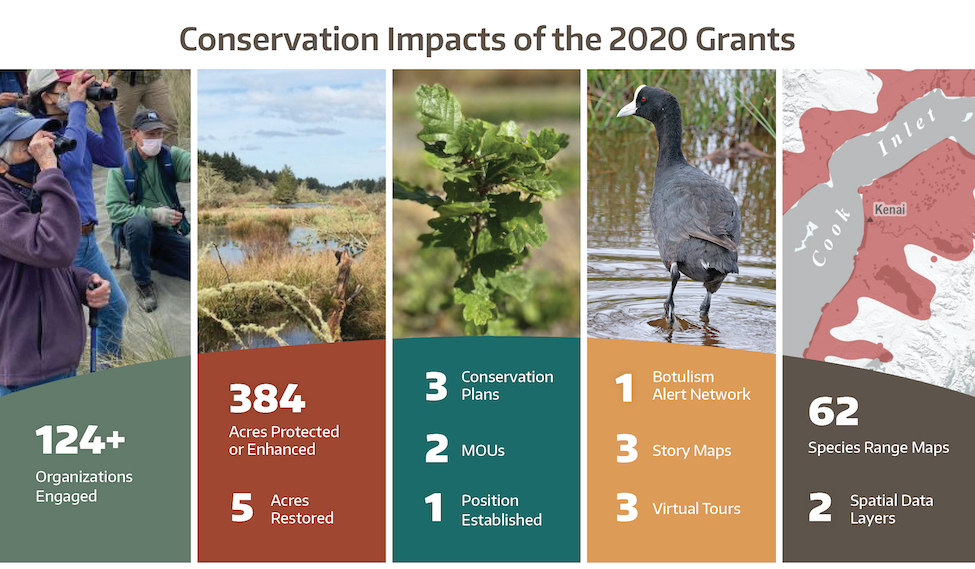
"The 2020 Pacific Birds Partnership Grant was incredibly valuable, not just to our organization, but to habitat conservation in the Humboldt Bay Region. This grant catalyzed a landmark conservation project that protected coastal dune forest, freshwater and saltwater wetlands, native dune mat, and bayfront habitats.
The support we received also led to a durable conservation coalition for the sustainable management of the ecological jewel that is the Somoa Dunes and Wetlands Conservation Area. We are grateful for Pacific Birdsʻ profound investment in such a transformative conservation project that will steward the biodiverse habitats of Humboldt Bay long into the future."
- Mike Cipra, Executive Director, Friends of the Dunes
See the Stories
Recipient of the 2024 Dr. Fern Duvall Conservation and Collaboration Award
Recipient of the 2024 Dr. Fern Duvall Conservation and Collaboration Award Jason Vercelli, Wildlife Biologist with the Hawaiʻi Department of Land and Natural Resources – Division of Forestry and Wildlife 2024 Fern Awardee, Jason Vercelli We are pleased to announce that Jason Vercelli, Wildlife Biologist with the Division of Forestry and Wildlife (DOFAW) has been […]
2024 Pacific Birds Partnership Grants RFP is Open
Our 2024 Partnership Grants RFP is open! We are interested in projects that will help conserve birds and their habitats and relate to our conservation priorities. The deadline to apply is July 1, 2024.
2023 Pacific Birds Partnership Grants RFP is Open
Our 2023 Partnership Grants RFP is open! We are interested in projects that will help conserve birds and their habitats and relate to one of our three conservation priorities.
Expanded Bird Rehabilitation on Kauaʻi Will Benefit Waterbirds
A 2022 Pacific Birds Partnership Grant has been supporting the expanded capabilities of a rescue and rehabilitation group on Kauaʻi, allowing them to provide better services for waterbirds.
Water is Everything at Hanalei
Infrastructure improvements being made at Hanalei National Wildlife Refuge are improving water quality and habitat for Hawaiʻi’s endemic waterbirds, such as the ʻAlae keʻoke ʻo or Hawaiian Coot and ʻAlae ʻula or Hawaiian Gallinule.
Congratulations to the 2022 Partnership Grant Awardees
Congratulations to the 2022 Partnership Grant awardees! Eight organizations, and many associated partners, will help advance conservation with coordination, planning, and outreach and communications projects.
2022 Partnership Grants RFP is Now Open
The Pacific Birds Partnership Grants application period for 2022 is May 20-June 30th. We welcome project ideas related to one of our three conservation priorities.
On-the-Ground and Virtual Conservation on Oʻahu
During the 2020-2021 school year, students at Le Jardin Academy were able to experience on-the-ground wetlands conservation within a State Wildlife Sanctuary, and the State Division of Forestry and Wildlife had a direct connection with future stewards of Hawaiʻi’s land and waters.
Nesting Isn’t Easy for ʻAlae ʻula
Biologists have been carefully monitoring Hāmākua and Kawainui Marsh Wildlife Sanctuaries in Hawaiʻi for ‘alae ‘ula nests. They will be using VHF transmitters to track survivorship, causes of mortality, and habitat use–informing scientists and managers about threats to these endangered birds when they are most vulnerable.
2021 Partnership Grant Awardees Announced
Pacific Birds 2021 Partnership Grant Awardees have been announced. Eleven partners have been awarded support to advance conservation work within our three conservation priorities.
